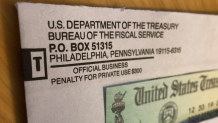Tax time is fast approaching -- and you can be sure that means scammers are aiming to do whatever they can to get their hands on your money.
That concern was on the mind of A.W., an NBC Bay Area viewer who came to us after he received something unexpected in the mail: two separate refund checks from the U.S. Department of the Treasury.
A.W. and his wife hadn't even begun to work on their 2019 tax returns yet. Why would the IRS be sending him money now? A.W. suspected it might be a scam, and he asked NBC Bay Area Responds to investigate.

IRS scams take on all shapes and sizes. The tax collection agency says a relatively new one works like this: hackers break into computer systems belonging to tax preparers and accountants. They steal customer data, and file bogus tax returns. Those taxpayers will receive a real, legitimate refund check from the IRS. Then, soon after, the crooks call the check recipient, posing as the IRS, and claiming there's been an error. They demand the taxpayer wire them the refund. By the time the taxpayer learns what's happened, their money is long gone.
The IRS first alerted taxpayers to this scheme in 2018, and it says the scam takes on a variety of forms. For example, the scammers might pose as a debt collection agent working for the IRS to demand payment, or they might claim they are law enforcement agents with an arrest warrant.
The crimes don't always involve printed checks, either. Some scammers will follow a tax refund via direct deposit to the victim's bank account, then call them and say the deposit was made in error. They will demand the taxpayer return the funds to a specific bank account, or even ask for access to the victim's bank account, which can expose the victim to even more financial losses.
Local
So if you receive an unexpected IRS refund check or bank deposit, what should you do?
First, don't deposit or cash the check. Immediately take it to your nearest IRS office and ask for verification. An IRS agent can tell you why you received the check, and whether anyone else filed for it without your knowledge.
Next, alert your tax preparer or accountant. If you file your own taxes, contact your regional IRS office for additional assistance.
As for A.W.'s case, the good news is he wasn't targeted by scammers after all. Following our advice, A.W. contacted his accountant and the IRS, and learned the refunds were owed from taxes filed several years ago. Nonetheless, A.W. was smart to question the unexpected windfall; too many tax scam victims fall prey to crooks because they didn't ask enough questions.



